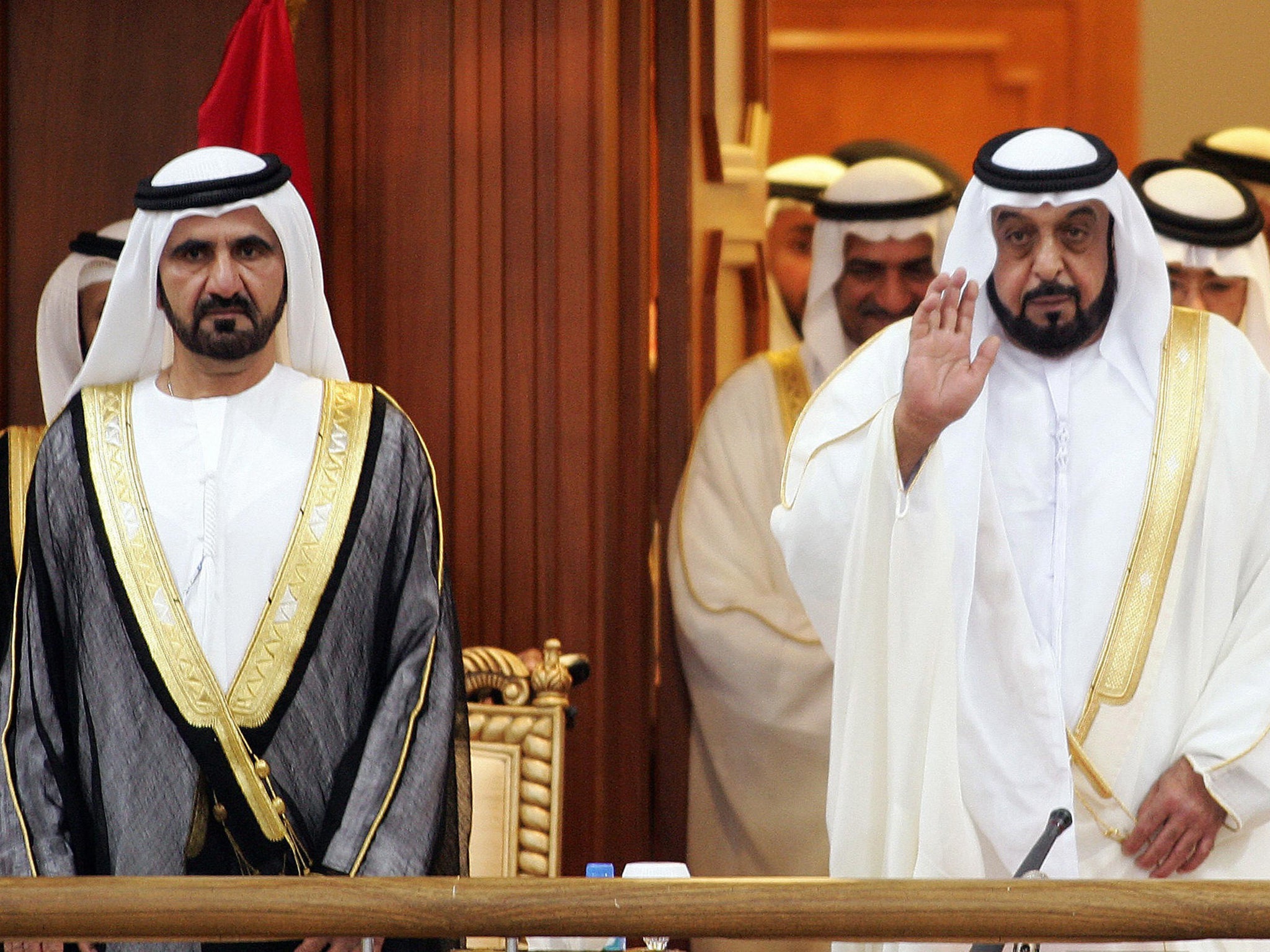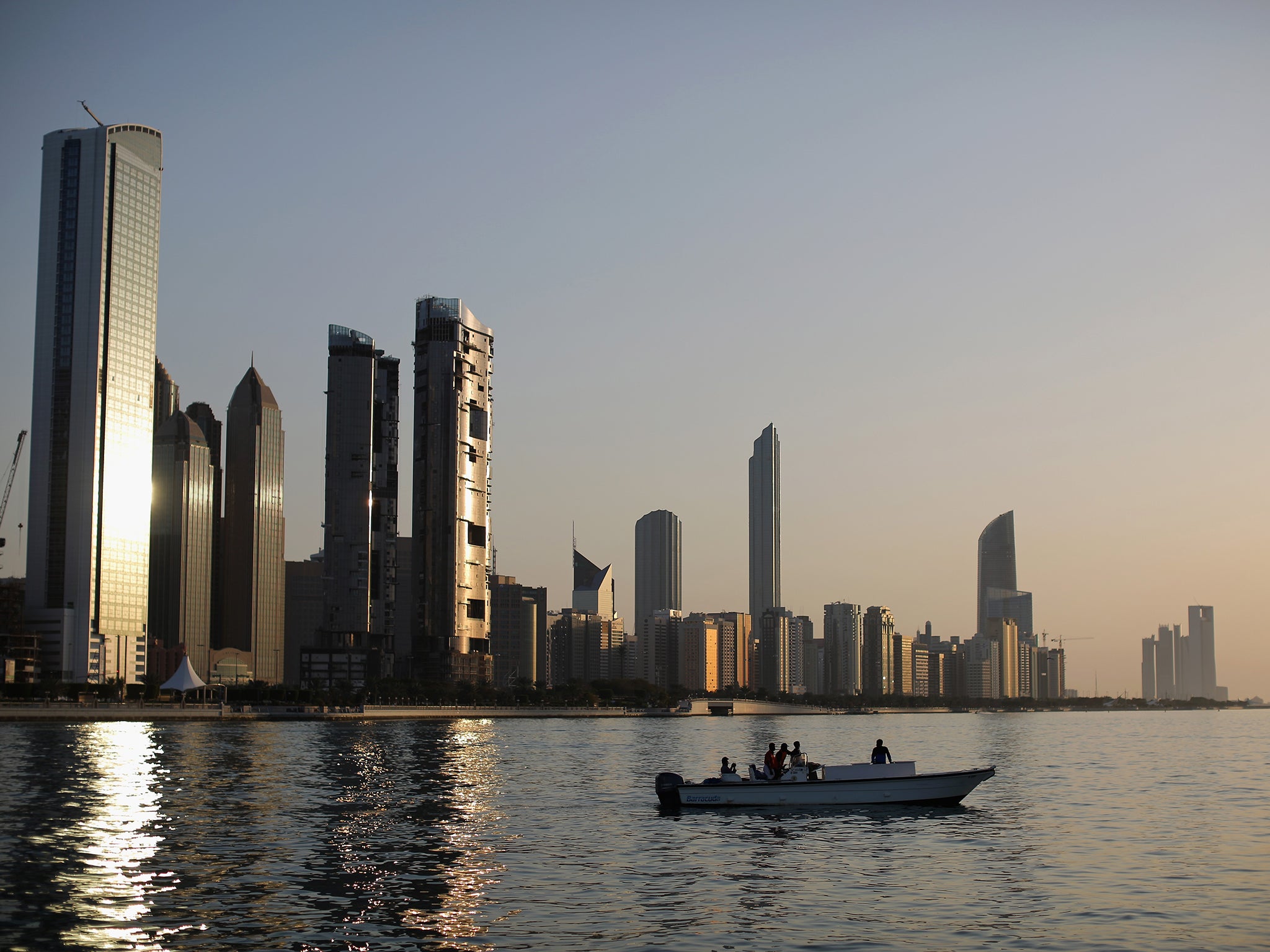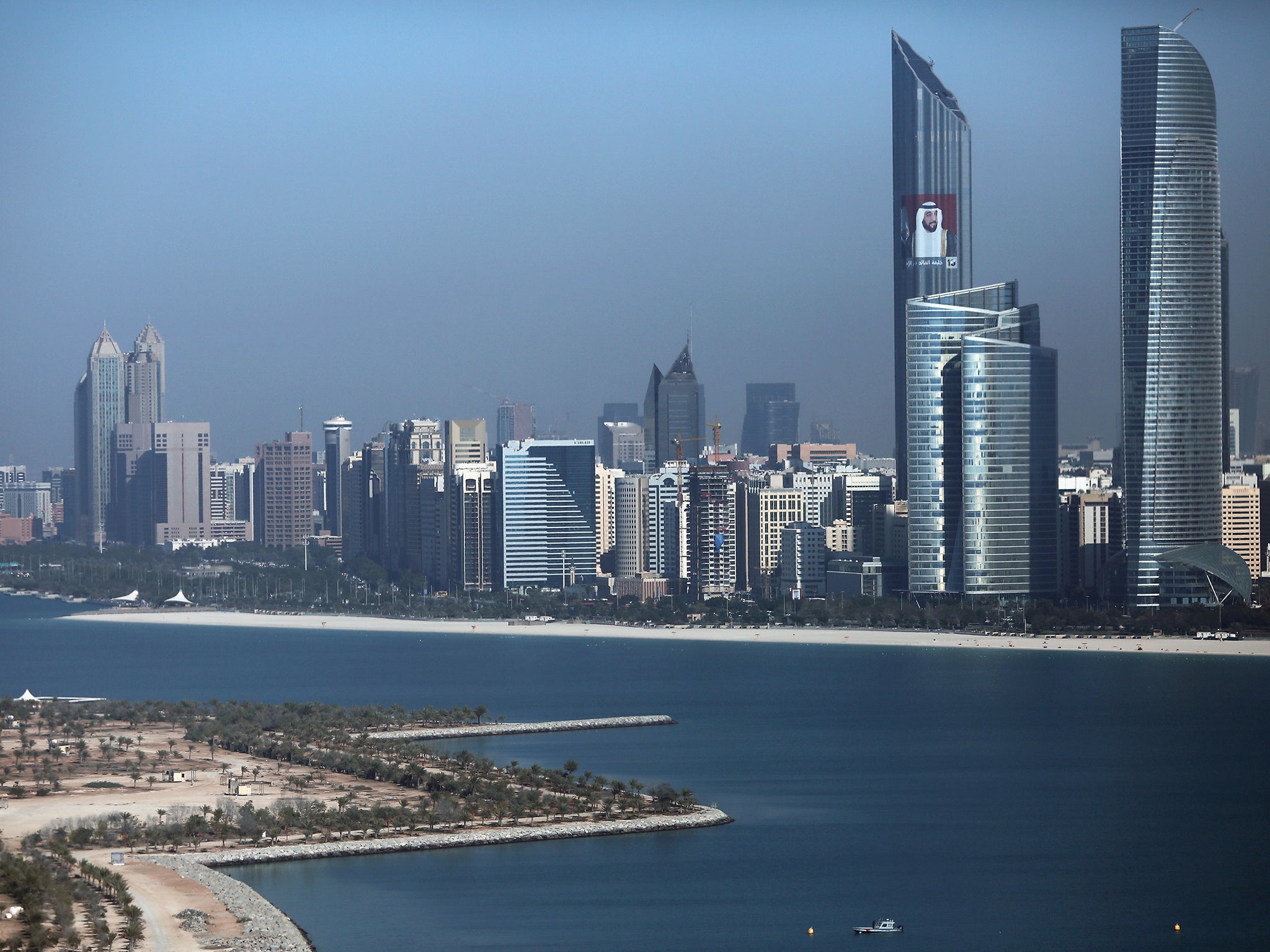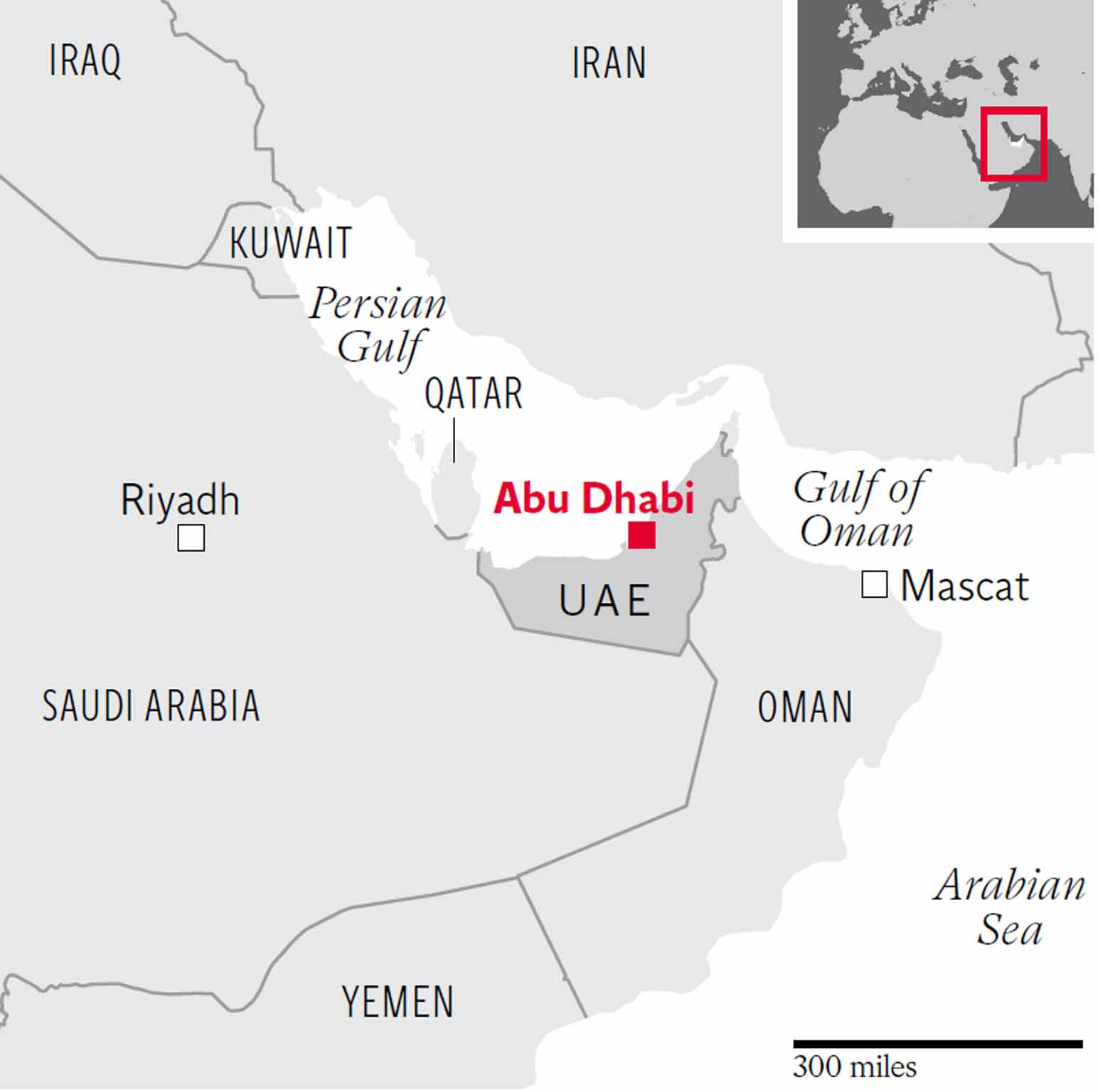Robert Fisk in Abu Dhabi: the Emirates enigma - who's really in charge?
Tracing the evolution of Abu Dhabi’s rulers from desert introverts to global treasure-hunters – and explaining the complex blend of kinship and rivalry that governs their relationship with the more ostentatious Dubai and Qatar

Your support helps us to tell the story
From reproductive rights to climate change to Big Tech, The Independent is on the ground when the story is developing. Whether it's investigating the financials of Elon Musk's pro-Trump PAC or producing our latest documentary, 'The A Word', which shines a light on the American women fighting for reproductive rights, we know how important it is to parse out the facts from the messaging.
At such a critical moment in US history, we need reporters on the ground. Your donation allows us to keep sending journalists to speak to both sides of the story.
The Independent is trusted by Americans across the entire political spectrum. And unlike many other quality news outlets, we choose not to lock Americans out of our reporting and analysis with paywalls. We believe quality journalism should be available to everyone, paid for by those who can afford it.
Your support makes all the difference.Old Walid Sadik was Abu Dhabi’s first “minister” of housing in 1968 and he remembers Sheikh Zayed bin Sultan al-Nahyan – whose son Khalifa now rules the emirate – living in a palace made of mud.
“Zayed’s brother, Sheikh Shakhbut, had been leader of Abu Dhabi but he was a stingy man, aggressive,” he recalls. “When he didn’t get a visa to visit England as quickly as he thought he should have, he cut off electrical power to the British embassy.” This wasn’t Shakhbut’s only eccentricity.
Robert Fisk in Abu Dhabi:
Out-of-sight migrants help build the dream
The acceptable face of the Emirates
Walid Sadik was an educated Palestinian – few Abu Dhabi citizens in those early days of the Trucial States were literate or could run ministries – and his official title was “General Manager for Housing Affairs”. There was little he did not see.
“Sheikh Shakhbut kept five million dinars [the equivalent of tens of millions of pounds] – the Abu Dhabi currency in those days – in sacks in the basement of his home,” he recalls. “One day the Abu Dhabi National Bank went to convince him to put his money in an account.” The bank gave the Abu Dhabi ruler a chequebook and told him that all he had to do to get his money back was to write a cheque for five million dinars.

“So the next morning, he wanted to know if he could trust the bank and he told his servants: ‘Write a cheque for five million dinars’. Of course, the bank had already invested the money, and they panicked. They called London and every other capital and managed to raise the five million back and took it back to Sheikh Shakhbut in sacks. And he said: “OK, I believe you. Fine, the cheque worked. Take the money back to the bank.”
That’s how things worked in Abu Dhabi then. Thankfully, Sheikh Zayed booted out his brother the year Walid Sadik arrived – but the new leader also maintained his Arab desert roots. “One day a Japanese company arrived to discuss plans for his new palace,” recalls Mr Sadik, who was at the crucial meeting. “The Japanese put the construction plans on the floor and one of them pointed out the plans, saying. ‘Here is the master bedroom, here is the salon, here is the kitchen’. And then the Japanese said: ‘Here is the toilet’.
“Sheikh Zayed stood up and left, shouting that ‘these foreigners are insulting us!’ You see, in those days, the Arabs believed the toilet should be outside the house, not inside a palace!”
This was the founder of modern-day Abu Dhabi, the man who would ultimately set his tiny emirate rise up as one of the richest nations of the Middle East.
But Arab leaders are as fragile as our own. When King Hussein of Jordan paid a visit to Abu Dhabi, Zayed’s little son, Khalifa, was too shy to meet him; he hid in an airport room and refused to emerge. Royal archives show a more confident Sheikh Khalifa in 1979, standing beside the yacht Britannia and greeting the female leader of the tribe of Windsor. Khalifa al-Nahyan is now the ruler of Abu Dhabi, President of all seven emirates, and leader of the Bani Yas confederation of tribes.
His Nahyan family had been rulers of what would become Abu Dhabi since the late 18th century. It was Dhiyab, grandson of the original Nahyan ruler, who drew the location of the present day island city after moving from an inland oasis with members of the Manaseer tribe. Abu Dhabi became a pearl fishery, although tribes traditionally controlled oases. And fighting tribes they were. In early 20th-century Abu Dhabi, four bin Zayed brothers – none of whom ruled for more than 10 years – each died in fratricidal war.
It was Sheikh Shakhbut – the man who did not trust banks – who took an oath with his own three brothers at the insistence of their mother, Sheikha Salama bin Butti, to end these terrible family quarrels. But that raised the question that still haunts the Arabian Peninsula, indeed all of the Arab nations: can tribes rule states? Or are they – in the words of the late Crusader historian, Steven Runciman, merely “tribes with flags”.
And tribes, let’s face it, haven’t done very well in the rest of the Middle East. Iraq is a deeply tribal country. So is Syria. And Libya. And it’s worth remembering that the original United Arab Emirates were supposed to include nine states, all of whom met under the chairmanship of the then 22-year-old Khalifa of Abu Dhabi. The al-Thanis of Qatar and the Khalifas of Bahrain opted out.
Amid the gleaming towers of Abu Dhabi, it’s difficult to imagine that the Emirates could now break apart. It was, after all, Harold Wilson ,and his decision to withdraw east of Suez, who brought the shocked tribes of the northern Gulf seaboard together in 1971. But I happened to be in Dubai in the late 1970s when an angry exchange between the Maktoums of Dubai and the al-Qasimis of Sharjah, now the third most populous city in the UAE, brought the two families to a state of near-hostility. By the time I reached the motorway bridge south of Dubai, each side’s armoured personnel carriers – British-made, of course – were facing off against each other. A flurry of diplomats, chiefly British and American, stroked the tribal feathers and within three hours their respective armies had disappeared.

But it was a warning. Brotherly tribes now prefer to demonstrate their prestige through investment. In Qatar, they say that their purchase of Paris Saint-Germain football club in 2011 was a necessary diplomatic, as well as financial, step after Abu Dhabi took over Manchester City three years earlier. That football club – whose main rival, Manchester United, is the favourite team of almost every Arab teenager – is scarcely a huge financial asset to the Emirate: it lost £23m last year, though that is mere pocket money for a state with an investment fund of £500bn.
Yet when the economic crisis blasted up the Gulf in 2008, it quickly became clear that the Nahyans of Abu Dhabi and the Maktoums of Dubai were not speaking the same language. There was a common belief that the Dubai World investment company – suddenly demanding a “standstill” from creditors with £40bn in debts – was guaranteed by Sheikh Khalifa’s government in Abu Dhabi. But financial consultants swiftly realised that this was an assumption – implied, imagined, taken on trust – and not necessarily true.
Dubai’s rulers told the press to “shut up”. But financiers started asking for the first time about the most glamorous assets of the richest emirates, Abu Dhabi and Dubai. What about the airline of the same name, Emirates, the success story of the Arab Gulf? Were its profits put back into the airline or to the family of the ruler of Dubai? The banks were blamed for over-exposing themselves.
Within 24 hours in late 2009, a Dubai appeal for a notional £18bn “restructuring” of debt was heading towards £30bn. Then Abdulrahman al-Saleh, the Dubai director of finance, announced that “we would like to emphasise the difference between support and guarantees – it was clear since the company’s establishment that it’s not guaranteed.”
This had not been at all clear to those who had rashly invested in artificial holiday islands visible from outer space. No-one knew what private agreements existed between Sheikh Khalifa in Abu Dhabi and Sheikh Rashid in Dubai. Indeed, relations between the various emirates’ sheikhs still remain opaque. They are meant to be.

I recall a Swedish diplomat and financial consultant at the time explaining to his colleagues how the relationship between leader and tribe in the Emirates was more important than that between state and citizen, that the Emirates were still not modern states and that matters were settled not by laws but “in front of the tent”. Someone “in front of the tent” might know today just where the profits of the new Abu Dhabi airline, Etihad, go. Outside Abu Dhabi now there is a whole Etihad city for pilots, crews, technicians, scientists.
Of course, Dubai – perhaps 30 per cent of its population have Iranian roots – did not sink, and an end to Iranian sanctions will bring untold rewards to Abu Dhabi’s larger neighbour. It will continue to be a hub (and pub) for travellers between India, Iran, China and Russia and the lands of the Arabs. But Abu Dhabi remains more serious, now even investing in a £2bn Serbian project to turn the east bank of the Sava river in Belgrade into a miniature glass-and-steel lookalike of an Emirates city.
Walid Sadik still remembers an Abu Dhabi with a population of 15,000 Bedouins who were distributed as servants loyal to each Sheikh – “5,000 to Zayed, 2,500 to Hamdan, 500 to Sheikh Mohammed, that’s how it went, and they would live and eat with their sheikhs.” Marwan Iskander, a Lebanese banker economist and financial adviser to a Gulf royal family, believes that tribes cannot ultimately run states. “They need a government that gives people a voice which is not there at the moment – not even in Lebanon.
“Tribes are connected by blood – for example, the tribe in Qatar is related to the tribe in Bahrain. Of course, the Saudis are a different breed, they insist on being the holy of holy people.”
In Abu Dhabi, you can almost touch the fear of Saudi Arabia, although none will admit to this. The puritanical Wahabi brand of Sunni Islam espoused by Saudi Arabia remains a threat to every Emirates tribe, although none will say so. The Saudi people, one Abu Dhabi resident said in a rather sinister aside, “live underground”.
Except when Bahrain found itself facing a Shia revolution – at which point the Saudi army emerged very much overground, driving across the causeway into Bahrain itself. It was the previous Emir of Qatar who once said to me that he would never ask the Americans to withdraw from his emirate “because if they did, my Arab brothers would invade me”.
I asked a good servant of the al-Nahyans in Abu Dhabi if tribes could create and run states. “Oh yes, I’ve lived here when tribes were very important,” he replied. “Initially, everything started by going through the tribes. But now I’m proud to be a UAE citizen. If people trust in future prosperity, they start to think rationally rather than ideologically. The tribes then become less important. You are proud because you become part of a successful state. Only if the state fails to make people part of one national project will the tribes trump over the state.”
Neither Abu Dhabi, or Dubai, or their satellite emirates can yet say, like Caesar, “alea iacta est” – the die is cast. Tribes with flags they may be, but they won’t go back to palaces of mud or basements packed with sacks of five billion dinars.
Join our commenting forum
Join thought-provoking conversations, follow other Independent readers and see their replies
Comments